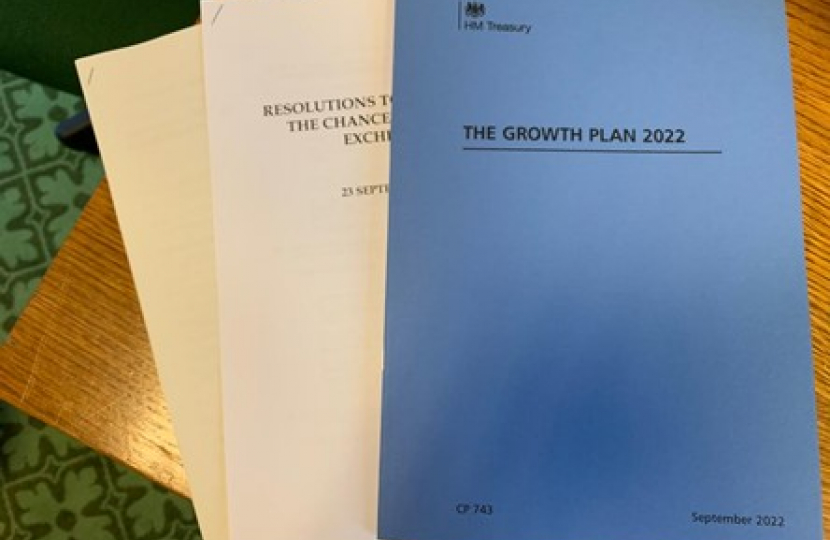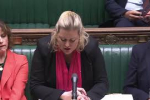
The Growth Plan 2022 makes growth the government’s central economic mission, setting a target of reaching a 2.5 per cent trend rate. Sustainable growth will lead to higher wages, greater opportunities and provide sustainable funding for public services and this is crucial to plan for as we go through these unsettled times. With a horrific war in Europe, it’s vital we need to test ourselves and look for a new plan where we are as resilient as possible in these toughest of times. There are many jitters around and I recognise this on behalf of my constituents.
Without action, Britain would potentially be in decline. For the two decades prior to the pandemic growth averaged 1.8%. Without higher growth being achieved given the challenges we have had, we are simply on a path to national decline, higher taxes, a worse NHS, and unaffordable services. Tackling potential stagflation is vital and I was very pleased to see the more positive growth figures this morning that we absolutely must build on.
The cost of not acting would have been higher in my view, as somebody who has spent the last few years as a Minister at DWP as well as a constituency MP. Businesses would have closed, and families would have been unable to heat their homes due to the energy challenge and no Government could stand by to see that. Just as we acted during covid to protect jobs and livelihoods, with the UK again facing Covid-style coordinated closures and drastic cutbacks in consumer spending it was critical the Government acted quickly. No action does have consequences too and I have been disappointed at the lack of coverage and explanations of our wider action and reasoning in the media.
As of this morning, the pound has recovered all of its losses since the announcement of the Growth Plan last week and Britain’s official forecaster has said it was mistaken about the country entering into a recession in the second quarter. The Office for National Statistics (ONS) revealed that the economy grew by 0.2pc in the second quarter, rather than the previous estimate of a 0.1pc fall in GDP.
The Growth Plan will deliver sustainable long-term growth. Independent forecasts suggest that the energy price guarantee, together with the tax cuts, will lead to positive GDP growth in the fourth quarter of this year, shortening the recession and raising annual GDP growth.
The Growth Plan makes good the Government’s commitment to cut taxes for people and businesses. The Government will cut National Insurance contributions from November and cancel the Health and Social Care Levy, meaning 28 million workers will keep an extra £330 per year, with the cut taking effect from 6 November. The Growth Plan also committed to keeping corporation tax at 19% to help drive economic growth.
The Growth Plan also brings forward the planned cut to the basic rate of income tax to April 2023. This will see the basic rate on income tax cut to 19 per cent, giving 31 million people a tax cut worth an average of £170 per year.
It is clear the abolition of the 45p tax rate has become a distraction from the Government's overriding mission to tackle the challenges facing our country. As a result, we are not proceeding with the abolition of the 45p tax rate.
This is in addition to the Government’s Energy Price Guarantee. The Guarantee will ensure that a typical household in Great Britain pays, on average, around £2,500 a year on their energy bill, for the next 2 years, from 1 October 2022. The consumer saving will be based on usage, but on average usage a household will save £1,000 a year (based on current prices from October).
The cap on Bankers’ bonuses will be removed by the Prudential Regulation Authority. This current cap limits remuneration of certain bank staff to 100 per cent of their fixed pay (or 200 per cent with shareholder approval). The bonus cap, it’s understood, served only to drive up non-performance-related pay, or more importantly drive activity outside Europe. Removing this, it’s believed, will move strengthen the incentive for financial institutions to create jobs here, invest here, and pay more taxes here. Pay in bonuses aligns the incentives of individuals with those of the bank, in turn supporting growth in the UK economy. All of this will come into the Exchequer to assist funding the crucial public services we all need and rely on.
Control over monetary policy, including decisions on interest rates to control inflation comes under the remit of the Bank of England. Since control of monetary policy was transferred from Government to the Bank of England 25 years ago, inflation has averaged precisely 2 per cent. It is right that the Bank of England is independent, and I know that the Governor and his team will take decisive action to get inflation back on target and ensure that inflation expectations remain firmly anchored. Of course, the impact of bold decisions has been felt and it’s vital we all work together to combat this.
At its meeting ending on 21 September 2022, the Monetary Policy Committee (MPC) voted to increase the Bank Rate by 0.5 percentage points, to 2.25 per cent. Interest rates for loans, including mortgages, should move in line with the Bank of England’s changes to the Bank Rate. The Committee also voted unanimously to reduce the stock of purchased UK government bonds, financed by the issuance of central bank reserves, by £80 billion over the next twelve months, to a total of £758 billion, in line with the strategy set out in the minutes of the August MPC meeting. It’s vital we work together on these matters and the Treasury engages strongly on these matters.
The fundamentals of the UK economy are sound as again we have seen this morning. We have the second lowest debt-to-GDP ratio in the G7. Even with the actions from the Growth Plan public sector debt is currently forecasted to rise to 91.6per cent of GDP in 2024-25, rather than fall to 87.5 per cent of GDP. Meaning it will remain lower than Canada, France, Italy, Japan and the United States.
On 23 November, the Chancellor will set out his updated Fiscal Plan in which he will set out further details on the government’s fiscal rules, including ensuring that debt falls as a share of GDP in the medium term. This will also be accompanied by a full forecast from the Office for Budget Responsibility.
I want to reassure you that many people have contacted me to say the changes on stamp duty and NI mean they can furnish and buy the homes they need, and in some cases, their mortgages will be lower than rents. However, I recognise this is not the case for some and it is vital that we work to work together to mitigate the impact of the bold decisions we have taken. Plus, businesses have confirmed the savings on NI will help keep staff on at a key time too. All of this needs to be seen on the round.
I appreciate it’s been an unsettling time as we try to tackle the impact of post covid a war due to Putin affecting us all and world with many challenges. There is no easy route in times like this and I will continue to do all I can on behalf of constituents to make sure they are supported whatever their circumstances.




